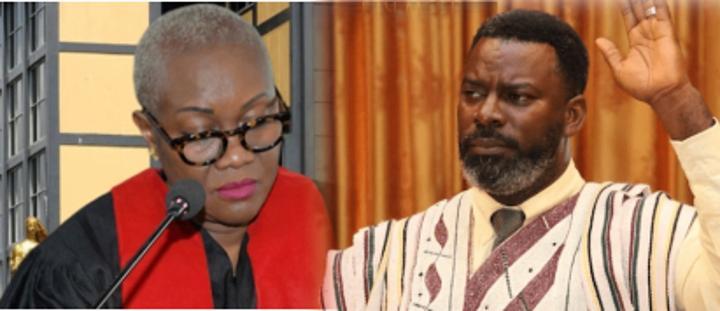Africa-Press – Liberia. The Chief Justice stressed that laws already exist to address littering and loitering, and that it is now the responsibility of city authorities to enforce them without fear or favor.
Chief Justice Sie-A-Nyene G. Yuoh has called on the Mayor of Monrovia, John-Charuk Siafa, to strictly enforce the Monrovia City Ordinance Laws to help clean the capital of plastic waste and other garbage.
Her remarks were made on Monday, June 16, 2025, during the opening of the Civil Law Court in Montserrado County.
The Chief Justice stressed that laws already exist to address littering and loitering, and that it is now the responsibility of city authorities to enforce them without fear or favor. She noted that if a vendor is seen surrounded by plastic waste and refuses to clean the area, the law must be applied and penalties imposed accordingly. She emphasized that the court will support any lawful action taken by the City Mayor within the scope of his authority to enforce sanitation laws.
She further stated that the Supreme Court has consistently ruled in favor of the Ministry of Public Works when it prohibits construction on public alleys, ordering demolitions in such cases based on legal standards.
According to her, the court respects the professional judgment of the Ministry and acts accordingly when properties are built illegally.
Also speaking at the event, Civil Law Court Judge Cllr. George W. Smith encouraged the City Mayor to install garbage bins in communities and public spaces. He said doing so would eliminate excuses from the public and make it easier for the court to enforce the Environmental Sanitation Law.
Judge Smith also urged Mayor Siafa to appeal to President Joseph Boakai for adequate funding in the national budget to support city cleaning efforts, noting that sanitation is a key part of the president’s ARREST agenda.
Judge Scheaplor R. Dunbar, presiding judge of the Civil Law Court Annex, raised concerns over the construction of large commercial buildings on wetlands and waterways, which he said contributes significantly to flooding in many communities.
He referenced the Environmental Protection Agency (EPA) Act of 2002, which gives the EPA authority to assess and approve development projects based on environmental impact studies. He questioned whether the EPA is properly conducting these assessments before granting approval for construction in sensitive areas.
Judge Dunbar urged the EPA and relevant government agencies to remain vigilant in their statutory duties to protect the environment and prevent disasters such as flooding. He highlighted the importance of ensuring environmental laws are enforced to safeguard communities from the impact of unregulated construction.
He also addressed persistent challenges facing the court in land-related cases, especially ejectment matters. He pointed out the increasing difficulties encountered during investigative and cadastral surveys ordered by the court.
The Liberia Land Authority (LLA), empowered by the 2016 LLA Act, is responsible for adjudicating land disputes and conducting court-ordered surveys. According to the judge, investigative surveys are essential for determining the rightful ownership of disputed properties.
Judge Dunbar noted that the court has adopted a policy of requiring all ejectment cases to undergo investigative surveys by the LLA. These surveys, combined with other trial evidence, assist jurors in reaching well-informed decisions.
However, he lamented that surveyors, police officers, and court officials are frequently met with hostility and sometimes violence from parties or entire communities attempting to obstruct the surveys.
He condemned these actions as illegal and counterproductive, emphasizing that obstructing surveys delays justice and complicates court proceedings. The judge stressed that such acts must cease and warned that individuals who interfere with survey operations risk legal consequences.
Additionally, Judge Dunbar called for the LLA to establish standardized, affordable fees for court-ordered investigative and arbitration surveys. He argued that leaving fee determination to individual surveyors is problematic. Setting clear and reasonable rates, he said, would help parties in litigation budget appropriately and speed up dispute resolution.
He urged the public to cooperate with lawful processes and reminded them that obstructing surveys harms their own cases. If parties want their land matters resolved quickly and fairly, he said, they must allow the courts and their technical partners to perform their duties without interference.
For More News And Analysis About Liberia Follow Africa-Press






